Critical Evaluation of Employee Engagement within the NHS System
VerifiedAdded on 2023/01/11
|9
|2627
|94
Report
AI Summary
This report provides a comprehensive analysis of employee engagement within the National Health Service (NHS). It begins with an introduction to the importance of employee engagement in organizational psychology, emphasizing its impact on productivity, staff turnover, and customer satisfaction. The main body critically evaluates the role of employee engagement within the NHS, highlighting its significance in improving patient care and addressing challenges. The report explores the dimensions of employee engagement within the NHS, including psychological, advocacy, and involvement aspects. It then delves into the challenges faced by the NHS in managing employee relations, such as lack of training, technological changes, and internal coordination issues. Furthermore, the report discusses relevant psychological theories, including behaviorist, humanistic, cognitive, and social exchange theories, and their application in healthcare settings. Recommendations are provided on improving employee engagement principles, such as clear communication, training, and collaborative leadership. The conclusion summarizes the key findings, reiterating the importance of employee engagement for the success of the NHS. The report references various academic sources to support its analysis and recommendations.
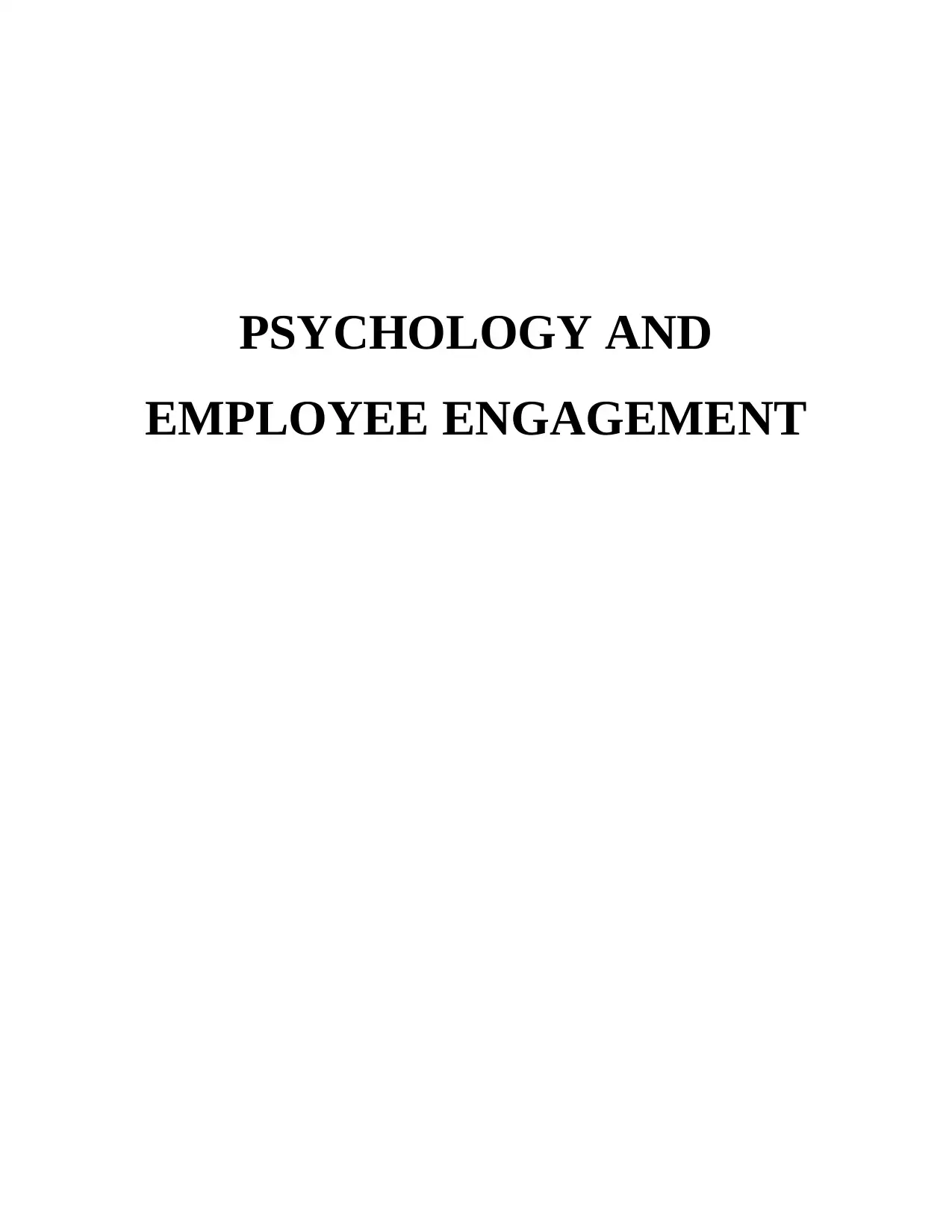
PSYCHOLOGY AND
EMPLOYEE ENGAGEMENT
EMPLOYEE ENGAGEMENT
Paraphrase This Document
Need a fresh take? Get an instant paraphrase of this document with our AI Paraphraser
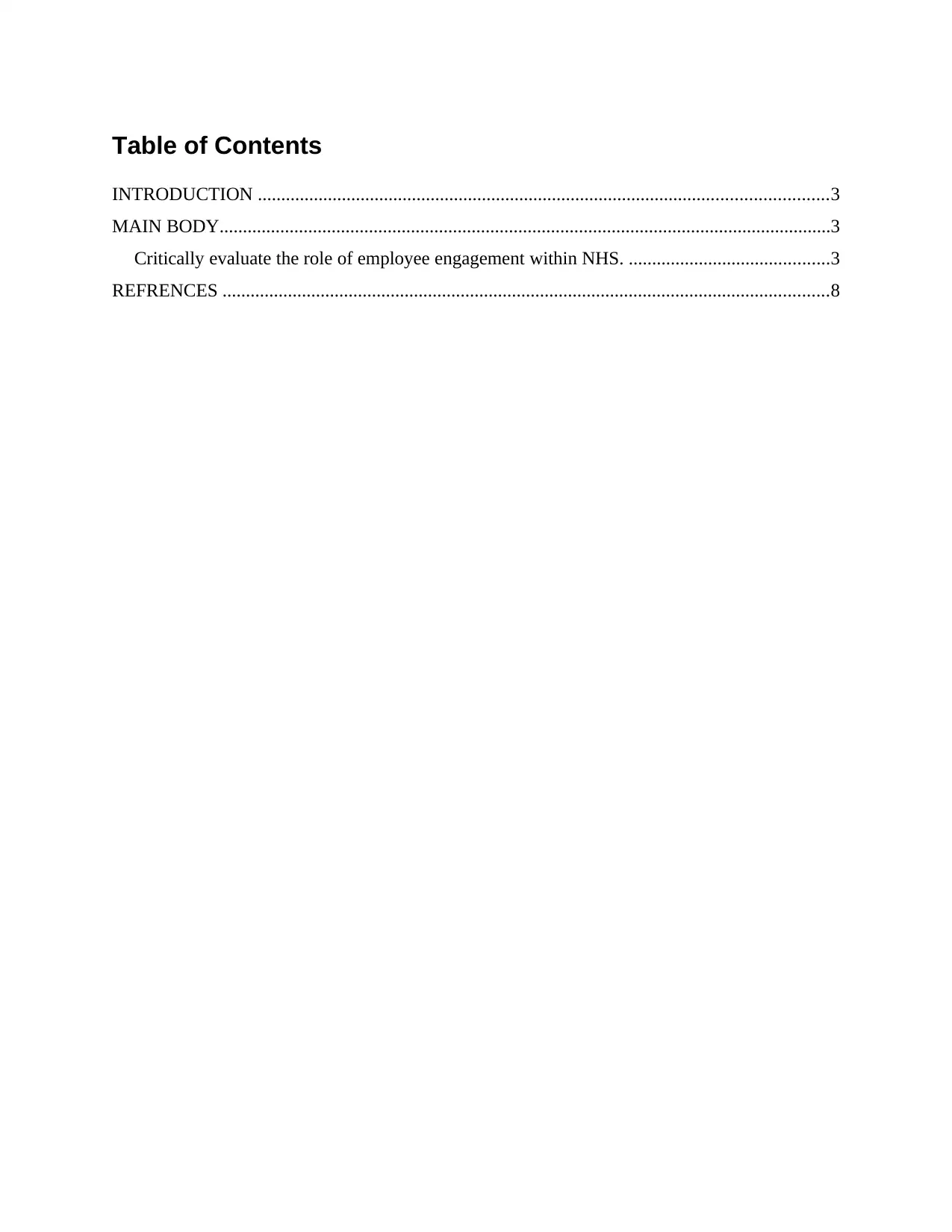
Table of Contents
INTRODUCTION ..........................................................................................................................3
MAIN BODY...................................................................................................................................3
Critically evaluate the role of employee engagement within NHS. ...........................................3
REFRENCES ..................................................................................................................................8
INTRODUCTION ..........................................................................................................................3
MAIN BODY...................................................................................................................................3
Critically evaluate the role of employee engagement within NHS. ...........................................3
REFRENCES ..................................................................................................................................8
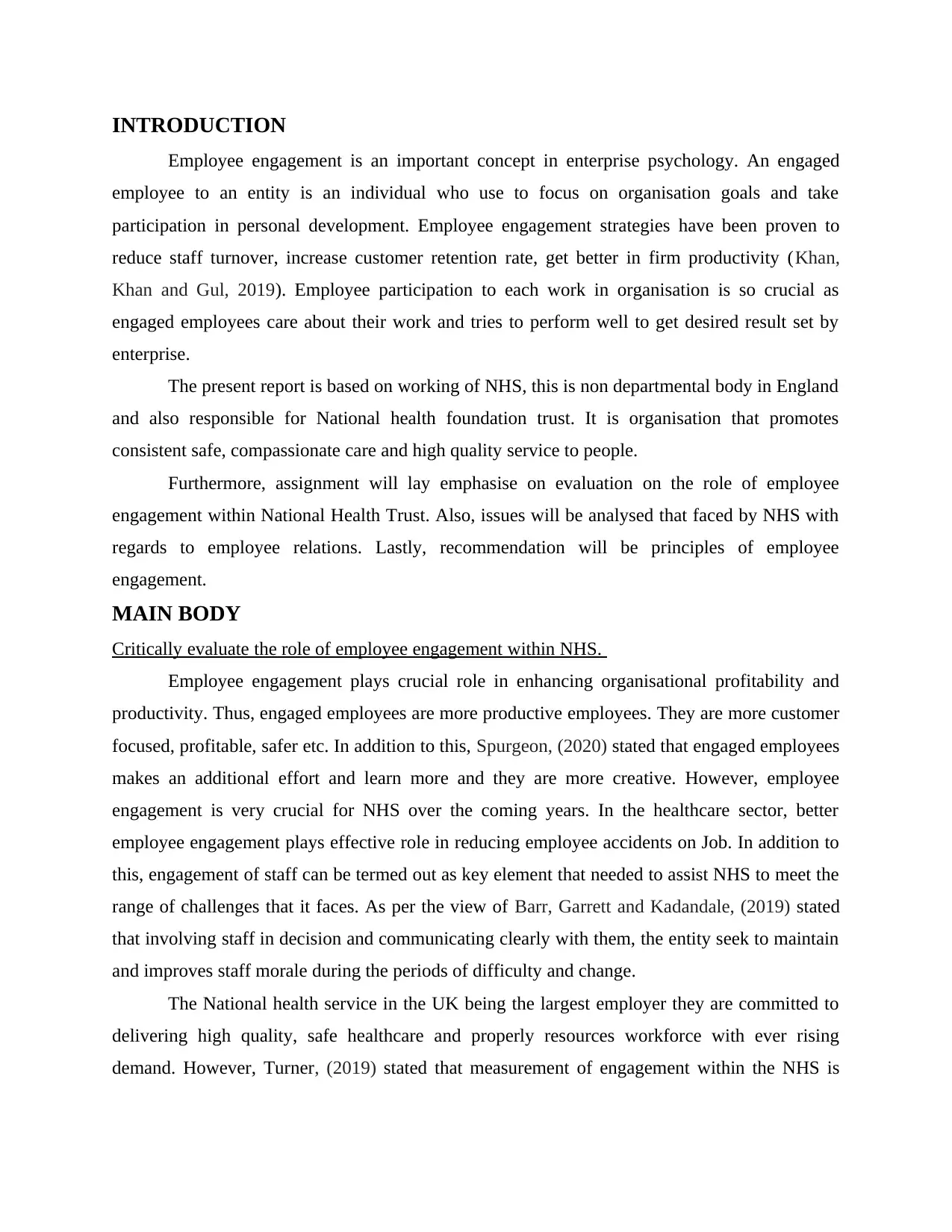
INTRODUCTION
Employee engagement is an important concept in enterprise psychology. An engaged
employee to an entity is an individual who use to focus on organisation goals and take
participation in personal development. Employee engagement strategies have been proven to
reduce staff turnover, increase customer retention rate, get better in firm productivity (Khan,
Khan and Gul, 2019). Employee participation to each work in organisation is so crucial as
engaged employees care about their work and tries to perform well to get desired result set by
enterprise.
The present report is based on working of NHS, this is non departmental body in England
and also responsible for National health foundation trust. It is organisation that promotes
consistent safe, compassionate care and high quality service to people.
Furthermore, assignment will lay emphasise on evaluation on the role of employee
engagement within National Health Trust. Also, issues will be analysed that faced by NHS with
regards to employee relations. Lastly, recommendation will be principles of employee
engagement.
MAIN BODY
Critically evaluate the role of employee engagement within NHS.
Employee engagement plays crucial role in enhancing organisational profitability and
productivity. Thus, engaged employees are more productive employees. They are more customer
focused, profitable, safer etc. In addition to this, Spurgeon, (2020) stated that engaged employees
makes an additional effort and learn more and they are more creative. However, employee
engagement is very crucial for NHS over the coming years. In the healthcare sector, better
employee engagement plays effective role in reducing employee accidents on Job. In addition to
this, engagement of staff can be termed out as key element that needed to assist NHS to meet the
range of challenges that it faces. As per the view of Barr, Garrett and Kadandale, (2019) stated
that involving staff in decision and communicating clearly with them, the entity seek to maintain
and improves staff morale during the periods of difficulty and change.
The National health service in the UK being the largest employer they are committed to
delivering high quality, safe healthcare and properly resources workforce with ever rising
demand. However, Turner, (2019) stated that measurement of engagement within the NHS is
Employee engagement is an important concept in enterprise psychology. An engaged
employee to an entity is an individual who use to focus on organisation goals and take
participation in personal development. Employee engagement strategies have been proven to
reduce staff turnover, increase customer retention rate, get better in firm productivity (Khan,
Khan and Gul, 2019). Employee participation to each work in organisation is so crucial as
engaged employees care about their work and tries to perform well to get desired result set by
enterprise.
The present report is based on working of NHS, this is non departmental body in England
and also responsible for National health foundation trust. It is organisation that promotes
consistent safe, compassionate care and high quality service to people.
Furthermore, assignment will lay emphasise on evaluation on the role of employee
engagement within National Health Trust. Also, issues will be analysed that faced by NHS with
regards to employee relations. Lastly, recommendation will be principles of employee
engagement.
MAIN BODY
Critically evaluate the role of employee engagement within NHS.
Employee engagement plays crucial role in enhancing organisational profitability and
productivity. Thus, engaged employees are more productive employees. They are more customer
focused, profitable, safer etc. In addition to this, Spurgeon, (2020) stated that engaged employees
makes an additional effort and learn more and they are more creative. However, employee
engagement is very crucial for NHS over the coming years. In the healthcare sector, better
employee engagement plays effective role in reducing employee accidents on Job. In addition to
this, engagement of staff can be termed out as key element that needed to assist NHS to meet the
range of challenges that it faces. As per the view of Barr, Garrett and Kadandale, (2019) stated
that involving staff in decision and communicating clearly with them, the entity seek to maintain
and improves staff morale during the periods of difficulty and change.
The National health service in the UK being the largest employer they are committed to
delivering high quality, safe healthcare and properly resources workforce with ever rising
demand. However, Turner, (2019) stated that measurement of engagement within the NHS is
⊘ This is a preview!⊘
Do you want full access?
Subscribe today to unlock all pages.

Trusted by 1+ million students worldwide
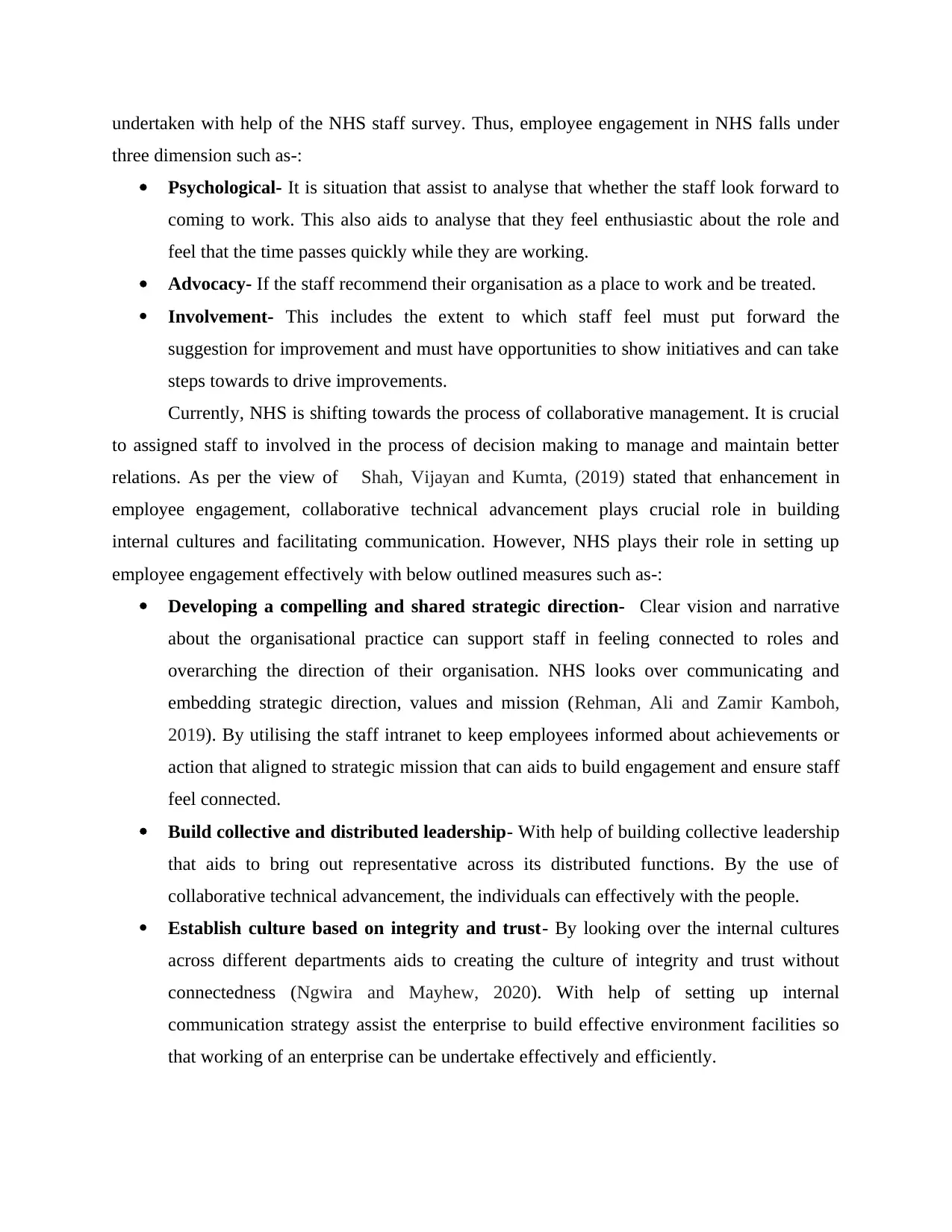
undertaken with help of the NHS staff survey. Thus, employee engagement in NHS falls under
three dimension such as-:
Psychological- It is situation that assist to analyse that whether the staff look forward to
coming to work. This also aids to analyse that they feel enthusiastic about the role and
feel that the time passes quickly while they are working.
Advocacy- If the staff recommend their organisation as a place to work and be treated.
Involvement- This includes the extent to which staff feel must put forward the
suggestion for improvement and must have opportunities to show initiatives and can take
steps towards to drive improvements.
Currently, NHS is shifting towards the process of collaborative management. It is crucial
to assigned staff to involved in the process of decision making to manage and maintain better
relations. As per the view of Shah, Vijayan and Kumta, (2019) stated that enhancement in
employee engagement, collaborative technical advancement plays crucial role in building
internal cultures and facilitating communication. However, NHS plays their role in setting up
employee engagement effectively with below outlined measures such as-:
Developing a compelling and shared strategic direction- Clear vision and narrative
about the organisational practice can support staff in feeling connected to roles and
overarching the direction of their organisation. NHS looks over communicating and
embedding strategic direction, values and mission (Rehman, Ali and Zamir Kamboh,
2019). By utilising the staff intranet to keep employees informed about achievements or
action that aligned to strategic mission that can aids to build engagement and ensure staff
feel connected.
Build collective and distributed leadership- With help of building collective leadership
that aids to bring out representative across its distributed functions. By the use of
collaborative technical advancement, the individuals can effectively with the people.
Establish culture based on integrity and trust- By looking over the internal cultures
across different departments aids to creating the culture of integrity and trust without
connectedness (Ngwira and Mayhew, 2020). With help of setting up internal
communication strategy assist the enterprise to build effective environment facilities so
that working of an enterprise can be undertake effectively and efficiently.
three dimension such as-:
Psychological- It is situation that assist to analyse that whether the staff look forward to
coming to work. This also aids to analyse that they feel enthusiastic about the role and
feel that the time passes quickly while they are working.
Advocacy- If the staff recommend their organisation as a place to work and be treated.
Involvement- This includes the extent to which staff feel must put forward the
suggestion for improvement and must have opportunities to show initiatives and can take
steps towards to drive improvements.
Currently, NHS is shifting towards the process of collaborative management. It is crucial
to assigned staff to involved in the process of decision making to manage and maintain better
relations. As per the view of Shah, Vijayan and Kumta, (2019) stated that enhancement in
employee engagement, collaborative technical advancement plays crucial role in building
internal cultures and facilitating communication. However, NHS plays their role in setting up
employee engagement effectively with below outlined measures such as-:
Developing a compelling and shared strategic direction- Clear vision and narrative
about the organisational practice can support staff in feeling connected to roles and
overarching the direction of their organisation. NHS looks over communicating and
embedding strategic direction, values and mission (Rehman, Ali and Zamir Kamboh,
2019). By utilising the staff intranet to keep employees informed about achievements or
action that aligned to strategic mission that can aids to build engagement and ensure staff
feel connected.
Build collective and distributed leadership- With help of building collective leadership
that aids to bring out representative across its distributed functions. By the use of
collaborative technical advancement, the individuals can effectively with the people.
Establish culture based on integrity and trust- By looking over the internal cultures
across different departments aids to creating the culture of integrity and trust without
connectedness (Ngwira and Mayhew, 2020). With help of setting up internal
communication strategy assist the enterprise to build effective environment facilities so
that working of an enterprise can be undertake effectively and efficiently.
Paraphrase This Document
Need a fresh take? Get an instant paraphrase of this document with our AI Paraphraser
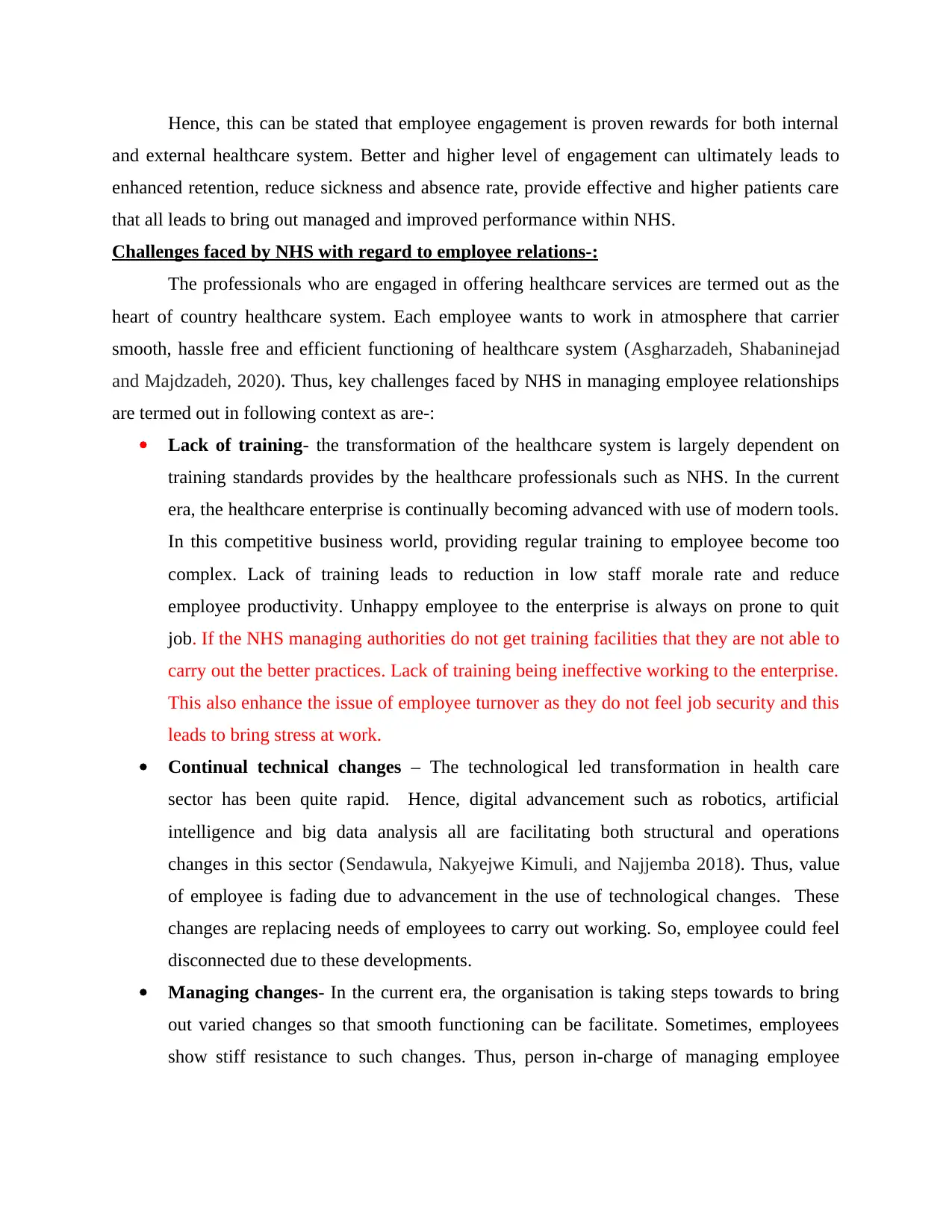
Hence, this can be stated that employee engagement is proven rewards for both internal
and external healthcare system. Better and higher level of engagement can ultimately leads to
enhanced retention, reduce sickness and absence rate, provide effective and higher patients care
that all leads to bring out managed and improved performance within NHS.
Challenges faced by NHS with regard to employee relations-:
The professionals who are engaged in offering healthcare services are termed out as the
heart of country healthcare system. Each employee wants to work in atmosphere that carrier
smooth, hassle free and efficient functioning of healthcare system (Asgharzadeh, Shabaninejad
and Majdzadeh, 2020). Thus, key challenges faced by NHS in managing employee relationships
are termed out in following context as are-:
Lack of training- the transformation of the healthcare system is largely dependent on
training standards provides by the healthcare professionals such as NHS. In the current
era, the healthcare enterprise is continually becoming advanced with use of modern tools.
In this competitive business world, providing regular training to employee become too
complex. Lack of training leads to reduction in low staff morale rate and reduce
employee productivity. Unhappy employee to the enterprise is always on prone to quit
job. If the NHS managing authorities do not get training facilities that they are not able to
carry out the better practices. Lack of training being ineffective working to the enterprise.
This also enhance the issue of employee turnover as they do not feel job security and this
leads to bring stress at work.
Continual technical changes – The technological led transformation in health care
sector has been quite rapid. Hence, digital advancement such as robotics, artificial
intelligence and big data analysis all are facilitating both structural and operations
changes in this sector (Sendawula, Nakyejwe Kimuli, and Najjemba 2018). Thus, value
of employee is fading due to advancement in the use of technological changes. These
changes are replacing needs of employees to carry out working. So, employee could feel
disconnected due to these developments.
Managing changes- In the current era, the organisation is taking steps towards to bring
out varied changes so that smooth functioning can be facilitate. Sometimes, employees
show stiff resistance to such changes. Thus, person in-charge of managing employee
and external healthcare system. Better and higher level of engagement can ultimately leads to
enhanced retention, reduce sickness and absence rate, provide effective and higher patients care
that all leads to bring out managed and improved performance within NHS.
Challenges faced by NHS with regard to employee relations-:
The professionals who are engaged in offering healthcare services are termed out as the
heart of country healthcare system. Each employee wants to work in atmosphere that carrier
smooth, hassle free and efficient functioning of healthcare system (Asgharzadeh, Shabaninejad
and Majdzadeh, 2020). Thus, key challenges faced by NHS in managing employee relationships
are termed out in following context as are-:
Lack of training- the transformation of the healthcare system is largely dependent on
training standards provides by the healthcare professionals such as NHS. In the current
era, the healthcare enterprise is continually becoming advanced with use of modern tools.
In this competitive business world, providing regular training to employee become too
complex. Lack of training leads to reduction in low staff morale rate and reduce
employee productivity. Unhappy employee to the enterprise is always on prone to quit
job. If the NHS managing authorities do not get training facilities that they are not able to
carry out the better practices. Lack of training being ineffective working to the enterprise.
This also enhance the issue of employee turnover as they do not feel job security and this
leads to bring stress at work.
Continual technical changes – The technological led transformation in health care
sector has been quite rapid. Hence, digital advancement such as robotics, artificial
intelligence and big data analysis all are facilitating both structural and operations
changes in this sector (Sendawula, Nakyejwe Kimuli, and Najjemba 2018). Thus, value
of employee is fading due to advancement in the use of technological changes. These
changes are replacing needs of employees to carry out working. So, employee could feel
disconnected due to these developments.
Managing changes- In the current era, the organisation is taking steps towards to bring
out varied changes so that smooth functioning can be facilitate. Sometimes, employees
show stiff resistance to such changes. Thus, person in-charge of managing employee
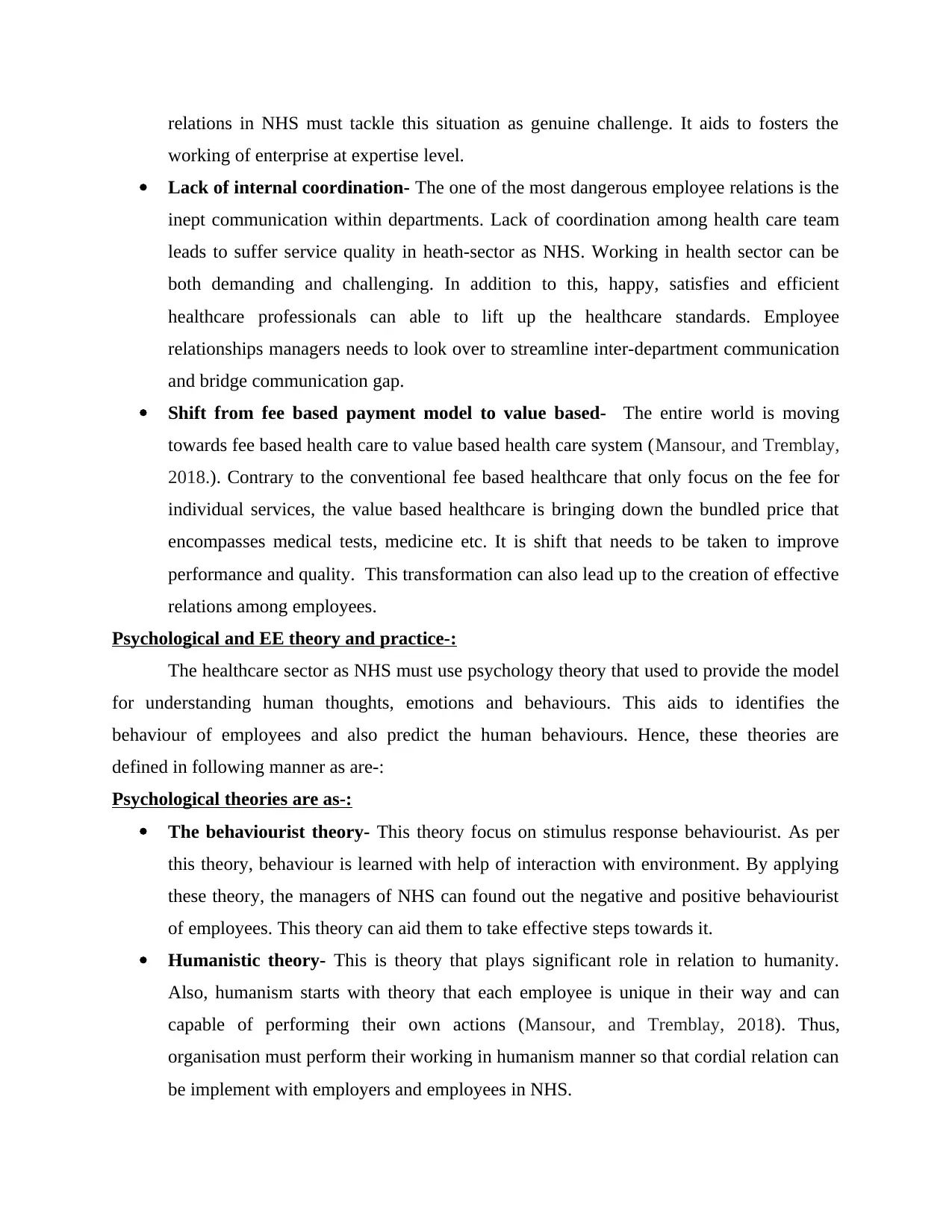
relations in NHS must tackle this situation as genuine challenge. It aids to fosters the
working of enterprise at expertise level.
Lack of internal coordination- The one of the most dangerous employee relations is the
inept communication within departments. Lack of coordination among health care team
leads to suffer service quality in heath-sector as NHS. Working in health sector can be
both demanding and challenging. In addition to this, happy, satisfies and efficient
healthcare professionals can able to lift up the healthcare standards. Employee
relationships managers needs to look over to streamline inter-department communication
and bridge communication gap.
Shift from fee based payment model to value based- The entire world is moving
towards fee based health care to value based health care system (Mansour, and Tremblay,
2018.). Contrary to the conventional fee based healthcare that only focus on the fee for
individual services, the value based healthcare is bringing down the bundled price that
encompasses medical tests, medicine etc. It is shift that needs to be taken to improve
performance and quality. This transformation can also lead up to the creation of effective
relations among employees.
Psychological and EE theory and practice-:
The healthcare sector as NHS must use psychology theory that used to provide the model
for understanding human thoughts, emotions and behaviours. This aids to identifies the
behaviour of employees and also predict the human behaviours. Hence, these theories are
defined in following manner as are-:
Psychological theories are as-:
The behaviourist theory- This theory focus on stimulus response behaviourist. As per
this theory, behaviour is learned with help of interaction with environment. By applying
these theory, the managers of NHS can found out the negative and positive behaviourist
of employees. This theory can aid them to take effective steps towards it.
Humanistic theory- This is theory that plays significant role in relation to humanity.
Also, humanism starts with theory that each employee is unique in their way and can
capable of performing their own actions (Mansour, and Tremblay, 2018). Thus,
organisation must perform their working in humanism manner so that cordial relation can
be implement with employers and employees in NHS.
working of enterprise at expertise level.
Lack of internal coordination- The one of the most dangerous employee relations is the
inept communication within departments. Lack of coordination among health care team
leads to suffer service quality in heath-sector as NHS. Working in health sector can be
both demanding and challenging. In addition to this, happy, satisfies and efficient
healthcare professionals can able to lift up the healthcare standards. Employee
relationships managers needs to look over to streamline inter-department communication
and bridge communication gap.
Shift from fee based payment model to value based- The entire world is moving
towards fee based health care to value based health care system (Mansour, and Tremblay,
2018.). Contrary to the conventional fee based healthcare that only focus on the fee for
individual services, the value based healthcare is bringing down the bundled price that
encompasses medical tests, medicine etc. It is shift that needs to be taken to improve
performance and quality. This transformation can also lead up to the creation of effective
relations among employees.
Psychological and EE theory and practice-:
The healthcare sector as NHS must use psychology theory that used to provide the model
for understanding human thoughts, emotions and behaviours. This aids to identifies the
behaviour of employees and also predict the human behaviours. Hence, these theories are
defined in following manner as are-:
Psychological theories are as-:
The behaviourist theory- This theory focus on stimulus response behaviourist. As per
this theory, behaviour is learned with help of interaction with environment. By applying
these theory, the managers of NHS can found out the negative and positive behaviourist
of employees. This theory can aid them to take effective steps towards it.
Humanistic theory- This is theory that plays significant role in relation to humanity.
Also, humanism starts with theory that each employee is unique in their way and can
capable of performing their own actions (Mansour, and Tremblay, 2018). Thus,
organisation must perform their working in humanism manner so that cordial relation can
be implement with employers and employees in NHS.
⊘ This is a preview!⊘
Do you want full access?
Subscribe today to unlock all pages.

Trusted by 1+ million students worldwide
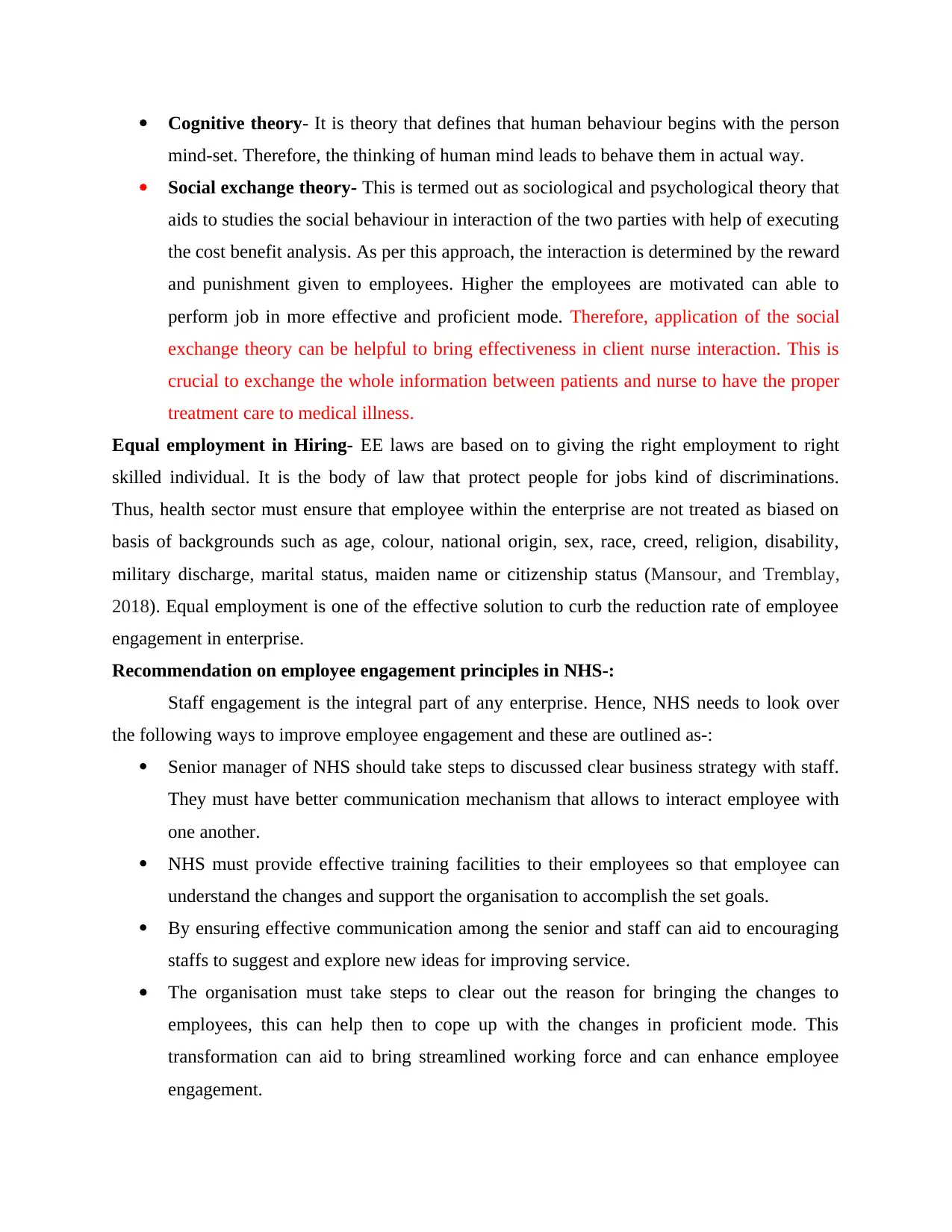
Cognitive theory- It is theory that defines that human behaviour begins with the person
mind-set. Therefore, the thinking of human mind leads to behave them in actual way.
Social exchange theory- This is termed out as sociological and psychological theory that
aids to studies the social behaviour in interaction of the two parties with help of executing
the cost benefit analysis. As per this approach, the interaction is determined by the reward
and punishment given to employees. Higher the employees are motivated can able to
perform job in more effective and proficient mode. Therefore, application of the social
exchange theory can be helpful to bring effectiveness in client nurse interaction. This is
crucial to exchange the whole information between patients and nurse to have the proper
treatment care to medical illness.
Equal employment in Hiring- EE laws are based on to giving the right employment to right
skilled individual. It is the body of law that protect people for jobs kind of discriminations.
Thus, health sector must ensure that employee within the enterprise are not treated as biased on
basis of backgrounds such as age, colour, national origin, sex, race, creed, religion, disability,
military discharge, marital status, maiden name or citizenship status (Mansour, and Tremblay,
2018). Equal employment is one of the effective solution to curb the reduction rate of employee
engagement in enterprise.
Recommendation on employee engagement principles in NHS-:
Staff engagement is the integral part of any enterprise. Hence, NHS needs to look over
the following ways to improve employee engagement and these are outlined as-:
Senior manager of NHS should take steps to discussed clear business strategy with staff.
They must have better communication mechanism that allows to interact employee with
one another.
NHS must provide effective training facilities to their employees so that employee can
understand the changes and support the organisation to accomplish the set goals.
By ensuring effective communication among the senior and staff can aid to encouraging
staffs to suggest and explore new ideas for improving service.
The organisation must take steps to clear out the reason for bringing the changes to
employees, this can help then to cope up with the changes in proficient mode. This
transformation can aid to bring streamlined working force and can enhance employee
engagement.
mind-set. Therefore, the thinking of human mind leads to behave them in actual way.
Social exchange theory- This is termed out as sociological and psychological theory that
aids to studies the social behaviour in interaction of the two parties with help of executing
the cost benefit analysis. As per this approach, the interaction is determined by the reward
and punishment given to employees. Higher the employees are motivated can able to
perform job in more effective and proficient mode. Therefore, application of the social
exchange theory can be helpful to bring effectiveness in client nurse interaction. This is
crucial to exchange the whole information between patients and nurse to have the proper
treatment care to medical illness.
Equal employment in Hiring- EE laws are based on to giving the right employment to right
skilled individual. It is the body of law that protect people for jobs kind of discriminations.
Thus, health sector must ensure that employee within the enterprise are not treated as biased on
basis of backgrounds such as age, colour, national origin, sex, race, creed, religion, disability,
military discharge, marital status, maiden name or citizenship status (Mansour, and Tremblay,
2018). Equal employment is one of the effective solution to curb the reduction rate of employee
engagement in enterprise.
Recommendation on employee engagement principles in NHS-:
Staff engagement is the integral part of any enterprise. Hence, NHS needs to look over
the following ways to improve employee engagement and these are outlined as-:
Senior manager of NHS should take steps to discussed clear business strategy with staff.
They must have better communication mechanism that allows to interact employee with
one another.
NHS must provide effective training facilities to their employees so that employee can
understand the changes and support the organisation to accomplish the set goals.
By ensuring effective communication among the senior and staff can aid to encouraging
staffs to suggest and explore new ideas for improving service.
The organisation must take steps to clear out the reason for bringing the changes to
employees, this can help then to cope up with the changes in proficient mode. This
transformation can aid to bring streamlined working force and can enhance employee
engagement.
Paraphrase This Document
Need a fresh take? Get an instant paraphrase of this document with our AI Paraphraser
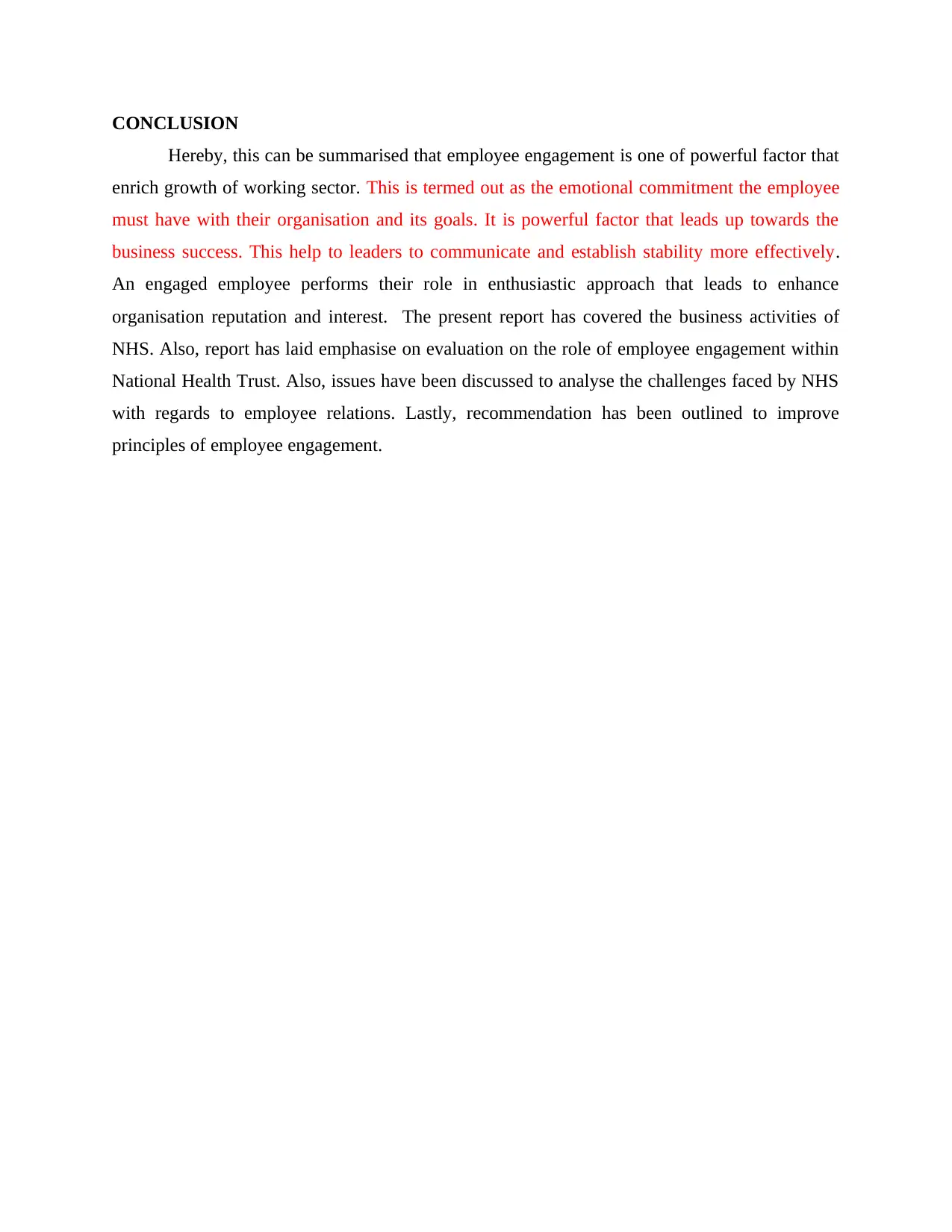
CONCLUSION
Hereby, this can be summarised that employee engagement is one of powerful factor that
enrich growth of working sector. This is termed out as the emotional commitment the employee
must have with their organisation and its goals. It is powerful factor that leads up towards the
business success. This help to leaders to communicate and establish stability more effectively.
An engaged employee performs their role in enthusiastic approach that leads to enhance
organisation reputation and interest. The present report has covered the business activities of
NHS. Also, report has laid emphasise on evaluation on the role of employee engagement within
National Health Trust. Also, issues have been discussed to analyse the challenges faced by NHS
with regards to employee relations. Lastly, recommendation has been outlined to improve
principles of employee engagement.
Hereby, this can be summarised that employee engagement is one of powerful factor that
enrich growth of working sector. This is termed out as the emotional commitment the employee
must have with their organisation and its goals. It is powerful factor that leads up towards the
business success. This help to leaders to communicate and establish stability more effectively.
An engaged employee performs their role in enthusiastic approach that leads to enhance
organisation reputation and interest. The present report has covered the business activities of
NHS. Also, report has laid emphasise on evaluation on the role of employee engagement within
National Health Trust. Also, issues have been discussed to analyse the challenges faced by NHS
with regards to employee relations. Lastly, recommendation has been outlined to improve
principles of employee engagement.
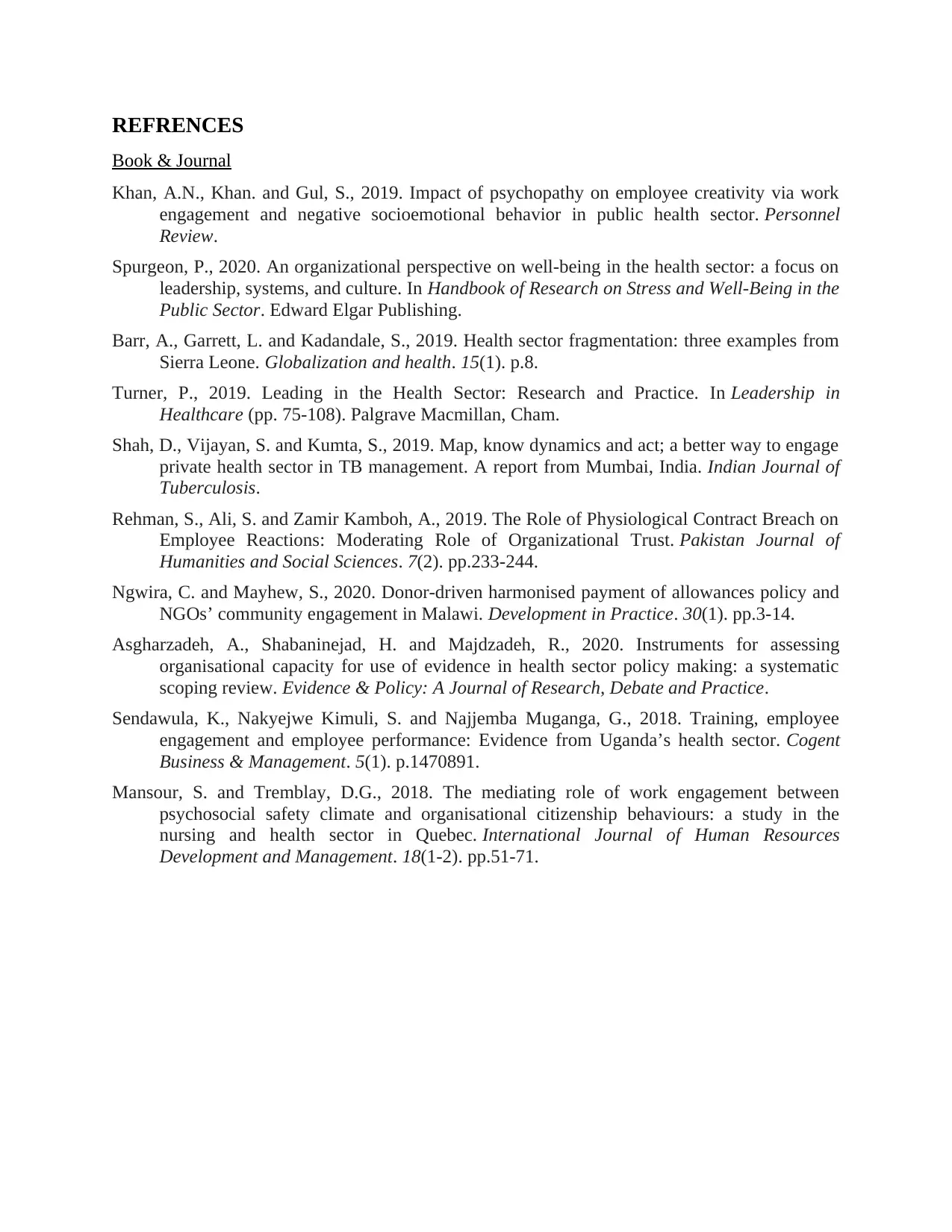
REFRENCES
Book & Journal
Khan, A.N., Khan. and Gul, S., 2019. Impact of psychopathy on employee creativity via work
engagement and negative socioemotional behavior in public health sector. Personnel
Review.
Spurgeon, P., 2020. An organizational perspective on well-being in the health sector: a focus on
leadership, systems, and culture. In Handbook of Research on Stress and Well-Being in the
Public Sector. Edward Elgar Publishing.
Barr, A., Garrett, L. and Kadandale, S., 2019. Health sector fragmentation: three examples from
Sierra Leone. Globalization and health. 15(1). p.8.
Turner, P., 2019. Leading in the Health Sector: Research and Practice. In Leadership in
Healthcare (pp. 75-108). Palgrave Macmillan, Cham.
Shah, D., Vijayan, S. and Kumta, S., 2019. Map, know dynamics and act; a better way to engage
private health sector in TB management. A report from Mumbai, India. Indian Journal of
Tuberculosis.
Rehman, S., Ali, S. and Zamir Kamboh, A., 2019. The Role of Physiological Contract Breach on
Employee Reactions: Moderating Role of Organizational Trust. Pakistan Journal of
Humanities and Social Sciences. 7(2). pp.233-244.
Ngwira, C. and Mayhew, S., 2020. Donor-driven harmonised payment of allowances policy and
NGOs’ community engagement in Malawi. Development in Practice. 30(1). pp.3-14.
Asgharzadeh, A., Shabaninejad, H. and Majdzadeh, R., 2020. Instruments for assessing
organisational capacity for use of evidence in health sector policy making: a systematic
scoping review. Evidence & Policy: A Journal of Research, Debate and Practice.
Sendawula, K., Nakyejwe Kimuli, S. and Najjemba Muganga, G., 2018. Training, employee
engagement and employee performance: Evidence from Uganda’s health sector. Cogent
Business & Management. 5(1). p.1470891.
Mansour, S. and Tremblay, D.G., 2018. The mediating role of work engagement between
psychosocial safety climate and organisational citizenship behaviours: a study in the
nursing and health sector in Quebec. International Journal of Human Resources
Development and Management. 18(1-2). pp.51-71.
Book & Journal
Khan, A.N., Khan. and Gul, S., 2019. Impact of psychopathy on employee creativity via work
engagement and negative socioemotional behavior in public health sector. Personnel
Review.
Spurgeon, P., 2020. An organizational perspective on well-being in the health sector: a focus on
leadership, systems, and culture. In Handbook of Research on Stress and Well-Being in the
Public Sector. Edward Elgar Publishing.
Barr, A., Garrett, L. and Kadandale, S., 2019. Health sector fragmentation: three examples from
Sierra Leone. Globalization and health. 15(1). p.8.
Turner, P., 2019. Leading in the Health Sector: Research and Practice. In Leadership in
Healthcare (pp. 75-108). Palgrave Macmillan, Cham.
Shah, D., Vijayan, S. and Kumta, S., 2019. Map, know dynamics and act; a better way to engage
private health sector in TB management. A report from Mumbai, India. Indian Journal of
Tuberculosis.
Rehman, S., Ali, S. and Zamir Kamboh, A., 2019. The Role of Physiological Contract Breach on
Employee Reactions: Moderating Role of Organizational Trust. Pakistan Journal of
Humanities and Social Sciences. 7(2). pp.233-244.
Ngwira, C. and Mayhew, S., 2020. Donor-driven harmonised payment of allowances policy and
NGOs’ community engagement in Malawi. Development in Practice. 30(1). pp.3-14.
Asgharzadeh, A., Shabaninejad, H. and Majdzadeh, R., 2020. Instruments for assessing
organisational capacity for use of evidence in health sector policy making: a systematic
scoping review. Evidence & Policy: A Journal of Research, Debate and Practice.
Sendawula, K., Nakyejwe Kimuli, S. and Najjemba Muganga, G., 2018. Training, employee
engagement and employee performance: Evidence from Uganda’s health sector. Cogent
Business & Management. 5(1). p.1470891.
Mansour, S. and Tremblay, D.G., 2018. The mediating role of work engagement between
psychosocial safety climate and organisational citizenship behaviours: a study in the
nursing and health sector in Quebec. International Journal of Human Resources
Development and Management. 18(1-2). pp.51-71.
⊘ This is a preview!⊘
Do you want full access?
Subscribe today to unlock all pages.

Trusted by 1+ million students worldwide
1 out of 9
Related Documents
Your All-in-One AI-Powered Toolkit for Academic Success.
+13062052269
info@desklib.com
Available 24*7 on WhatsApp / Email
![[object Object]](/_next/static/media/star-bottom.7253800d.svg)
Unlock your academic potential
Copyright © 2020–2025 A2Z Services. All Rights Reserved. Developed and managed by ZUCOL.





